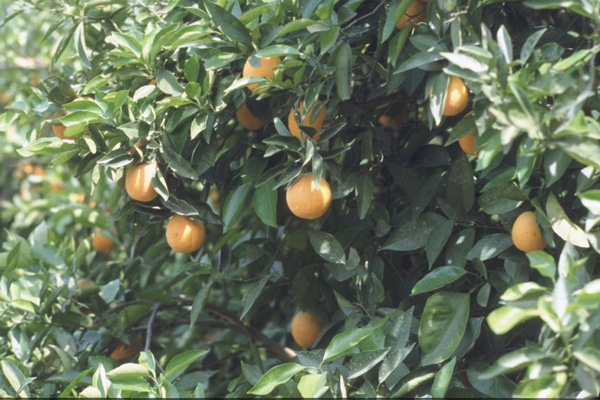
Mercury could drop as low as 28-degrees and citrus fruit and trees could still weather the cold depending on how long temperatures remained below freezing.Bitterly cold conditions currently affecting the Plains and Midwest will continue to slide southeast and are likely to adversely affect Florida citrus on Tuesday and Wednesday mornings.

With a colder-than-normal winter across much of the nation and a dual assault from arctic cold fronts already this year, the Florida citrus industry is predicting potential fruit damage this week as frost and icy-temps filter as far south as the Sunshine State.
Citrus growers in the Texas Valley meanwhile are holding their breath, but hoping for the best as temperatures plunge to near or just below freezing this week as far south as McAllen/Harlingen.
"We've been okay so far this year but tonight (Jan. 6) the mercury is expected to nudge down to freezing or just below, so there is some concern," reports Brad Cowan, CEA-Agriculture & Natural Resources, Texas A&M AgriLife Extension in Hidalgo County.
He says the mercury could drop as low as 28-degrees and citrus fruit and trees could still weather the cold depending on how long temperatures remained below freezing.
"We're hopeful it doesn't clear off and the clouds will remain to keep us from dropping too low. That is our greatest concern with these cold fronts," he added.
Bitterly cold conditions currently affecting the Plains and Midwest will continue to slide southeast and are likely to adversely affect Florida citrus on Tuesday and Wednesday mornings. The cold will not be nearly as intense by the time it reaches Florida officials say, but readings are expected to drop below freezing in many areas.
If you are enjoying reading this article, please check out Southwest Farm Press Daily and receive the latest news right to your inbox.
"Current expectations are that about half of the Florida citrus belt will see frost on Tuesday morning, with a hard freeze that could lead to some crop damage in the northeastern 10-15 percent of the belt," said Don Keeney, Senior Agricultural Meteorologist for MDA Weather Services. "Low temperatures will likely dip into the upper 20s in places such as Lake Alfred, Orlando, and Daytona."
In contrast, Ray Prewett, President of Texas Citrus Mutual, says he is optimistic and doesn't believe Valley citrus is at risk from freezing weather this week. He says he believes temperatures will hover in the 30s across most of the Valley.
A check across the Valley indicates so far the season is shaping up to be a good one for citrus growers. Demand remains high and prices are good according to most fruit growers.
The Valley citrus industry has been working overtime the last two years after Huanglongbing (HLB), or citrus greening disease, was first discovered in an orange grove in 2012. In October of last year, a single grapefruit tree tested positive for the disease. A second quarantine zone, consisting of 1,760 total acres of commercial citrus, was established. As a result this limits the movement of citrus stock from the grove to packing facilities and also the movement of citrus nursery trees from the quarantine zone.
In spite of the dangers posed by the presence of the disease in Texas, grower cooperation in the Valley combined with an aggressive trapping, treatment and inspection program has limited the spread of the disease. Texas Department of Agriculture officials have commended Valley growers for their quick response and diligent efforts.
Huanglongbing is a bacterial plant disease that is not harmful to humans or animals but is fatal for citrus trees. The disease destroys the production, appearance and economic value of citrus trees. Diseased trees produce bitter, hard, misshapen fruit over time and the tree will die within a few years of being infected if not removed immediately. In the Valley, infected trees were destroyed as soon as they tested positive.
In terms of harvest this year, neither the disease or worsening winter conditions have hampered harvest or affected the quality of the fruit.
"So far the season is looking good for local growers," added Cowan.
Also of interest:
About the Author(s)
You May Also Like



